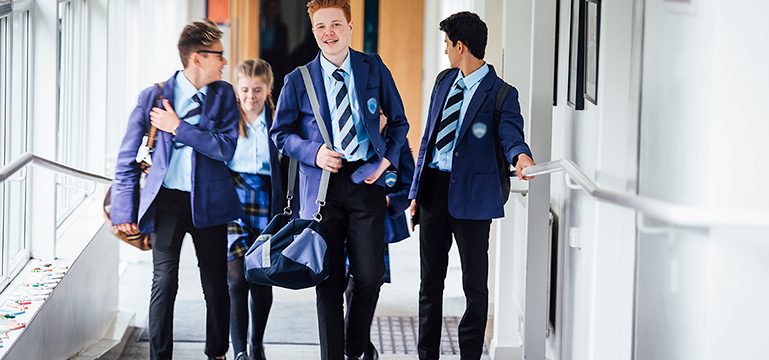Developing an effective culture for learning

Quick links:
Information about the school
Whitmore High School opened in 2018 on the same site as Barry Comprehensive School. Since then, a substantial transformation project has taken place during which the school moved from a single sex, boys’ school to a mixed comprehensive. The school moved into a new building in 2021. There are 1082 pupils on roll, including around 160 in the sixth form. Around 20% of all pupils are eligible for free school meals. The headteacher was appointed in 2019.
Context and background to the effective or innovative practice
Whitmore High School’s philosophy is grounded firmly on the ‘four pillars’ that provide the basis for developing the whole child, and which form ‘The Whitmore Values’: respect, responsibility, resilience and working hard. This philosophy is advocated by nearly all staff who work to ensure that pupils are valued and listened to, are treated as individuals, and receive consistently good teaching and extensive opportunities outside lessons. This enables them to succeed in their learning and nurtures their passions and talents.
Description of the nature of the strategy or activity
At Whitmore High School, a ‘culture for learning’ has been created in which structure and routine allow pupils to thrive. Clear boundaries and expectations, delivered consistently by all members of staff, allow pupils to feel safe to take risks in lessons:
A well-established ‘Culture for Learning’ is valued by staff and pupils and has a significant impact on the positive attitudes and behaviour of most pupils’ (Estyn 2022).
All interactions within the school revolve around the four key values, co-created by staff and pupils. A high level of mutual respect and trust has developed between staff and pupils, and this has been achieved by staff consistently modelling and referencing the school values when dealing with positive and negative attitudes to learning. To ensure consistency, a centralised behaviour system has been created around the four values to ensure that every instance of positive and negative behaviour is dealt with in a consistent and fair manner. Consequences such as detentions, restorative conversations and parent meetings are delivered by the senior leadership team in every case.
Training in the form of INSET, staff briefings and coaching has focused on developing a shared vocabulary amongst staff, further ensuring consistency. Outstanding attitudes to learning are created by developing a culture in which staff and pupils display the core values at all times and take responsibility for their own actions.
A key element of the ‘culture for learning’ has been the eradication of mobile phones during the school day. This has been achieved through a consistent approach to any phone use. Pupils and parents understand the consequences of phone use, which has led to very few instances of pupils using their phones in school. There have been significant benefits to this approach, both academically and pastorally, with nearly all lessons having no disruption due to phone use and pupils enjoying board games in groups at lunchtime as opposed to using their devices.
It is important to note that Whitmore High School recognises that a behaviour system on its own will not transform attitudes to learning. The ‘direct teaching approach’ consistently implemented by all staff provides a consistent and calm atmosphere in classrooms that is closely aligned to the ‘culture for learning’. Expected behaviours are mapped against each section of a lesson, ensuring clarity for both staff and pupils. The link between high quality teaching and behaviour is embedded within the school culture for learning.
A vital element of the school’s ‘culture for learning’ is the understanding that, for a small number of pupils, this consistent structure and routine does not meet their needs. The school’s inclusive and supportive ethos ensures that those who need additional support benefit significantly from the integrated care, learning and well-being provision at the school such as the support hubs, the ‘Successful Outcomes Centre’ and the specialist resource base for pupils with an autistic spectrum condition. Opportunities such as mastering baking skills in the school bakery, working alongside the school’s two therapy dogs, Daisy and Pilot, playing chess and being part of inclusive sports teams provide further opportunities for pupils to develop social and emotionally, allowing them to become resilient, independent and ambitious learners.
What impact has this work had on provision and learners’ standards?
Many pupils make strong development in their social and life skills through the extensive enrichment programme at Whitmore High School. This includes a wide range of after-school clubs including Olympic weightlifting, endurance and BBC Young Reporters clubs as well as considerable music, drama and sporting opportunities. Pupil participation rates in these activities are high. The skills and confidence gained within these activities have translated to significantly improved attitudes to learning in the classroom.
The introduction of the ‘culture for learning’ has led to most pupils behaving well in lessons and around the school, with behaviour in the majority of lessons being described as exemplary. This atmosphere in which pupils feel safe to take risks has led to many pupils making rapid and secure progress.